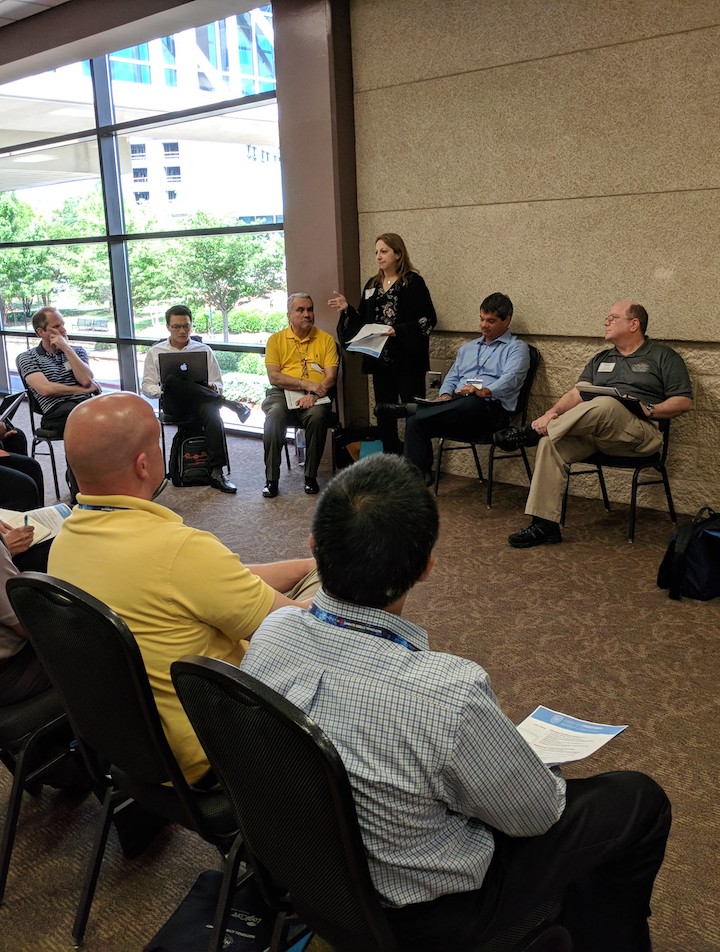Southeast cybersecurity experts collaborate to advance cyber defense education
June 12, 2018

Some of the brightest cybersecurity educators in the Southeast stayed long after their session concluded on June 5 to swap business cards and seek opportunities to collaborate among their respective institutions.
Forty cybersecurity educators participated in the National Security Agency/Department of Homeland Security Southeast Centers of Academic Excellence Regional Resource Center Collaboration Meeting in Huntsville, Alabama. The University of West Florida Center for Cybersecurity hosted the Southeast session in conjunction with the Center of Academic Excellence (CAE) Community Meeting.
Educators from institutions in Alabama, Florida, Georgia, Mississippi, Puerto Rico and South Carolina shared program updates and discussed collaborative initiatives among CAE designated institutions. The initiatives included workforce development, community engagement, K-12 outreach and research collaborations.
Dr. Eman El-Sheikh, University of West Florida Center for Cybersecurity director, and Anthony Pinto, UWF Computer Science lecturer and CAE faculty fellow, organized and moderated the session. UWF is the CAE Regional Resource Center for the Southeast. In its role as the Southeast hub, UWF provides leadership to advance cyber defense education and supports institutions seeking CAE designation.
“We were able to address some issues related to our regional training efforts and, in general, discuss how to grow cyber, including the use of the (National Initiative for Cybersecurity Education) Challenge Projects,” Pinto said. “It was interesting to note that many of the participants stayed around after the session was completed to continue in the discussions and ask questions.”
Dr. Deidre Evans, associate dean of the Florida A&M College of Science and Technology, stayed after to seek input from cybersecurity educators on how to expand their cybersecurity curricula.
“I’m always interested in curricular development because we’re looking for ways to broaden our program exposure to not just our current majors in computer science, IT and computer information systems, but also to impact all students at Florida A&M University,” Evans said. “We’re currently offering a minor in cybersecurity, but we are looking to develop undergraduate and graduate degree programs, so we’re looking to collaborate with others like West Florida.”
Ernest M. Friend, instructional program manager for the Florida State College at Jacksonville Center for Cyber Security, locked in on how other CAE institutions educate K-12 students. He said the number of dual-enrollment students enrolling at FSCJ for its two-year cybersecurity degree program is on the rise.
“The first cohort actually just walked across the stage for commencement a few weeks ago,” Friend said. “There are six high school students who got their two-year degree in cybersecurity before they got their high school diploma so we’re excited about that. We started off with six and this year we’ve got about 25 and we’ve got 50 lined up after that. There’s a lot of potential with that for us.”
UWF supported FSJC and Calhoun Community College in their pursuits of CAE designation. Each institution received designation as a National Center of Academic Excellence in Cyber Defense Education by the National Security Agency and Department of Homeland Security at a ceremony on June 6 in Huntsville.
To further advance cybersecurity education regionally and nationally, the UWF Center for Cybersecurity is hosting the 2018 CAE Southeast Cybersecurity Conference on July 26-27 in Orlando. The SECC will help build a vibrant, collaborative CAE Cybersecurity Community in the Southeast and enhance opportunities to collaborate.
For more information, please visit uwf.edu/cybersecurity.







